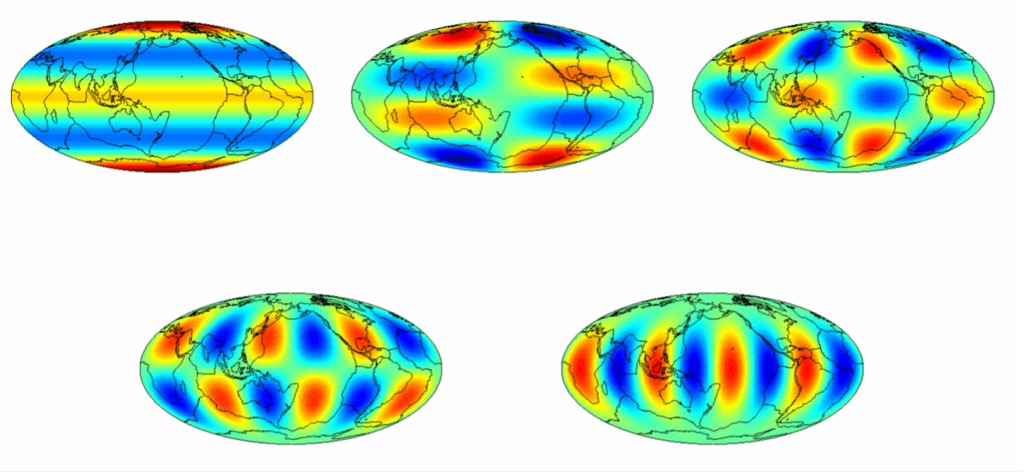From Core to Crust: Understanding Earth’s Rhythms with Normal Mode and Surface Wave Seismology
Seismology, the study of seismic waves generated by earthquakes and other natural or artificial sources, provides a window into the deep interior of our planet. Because direct observation of Earth’s interior is impossible, seismology remains one of the most powerful tools available to scientists seeking to understand its internal structure and dynamics – from the molten outer core to the brittle crust. Among the many approaches used in this field, Normal Mode Seismology occupies a particularly important place for its unique ability to probe the planet as a whole.

Some of the standing wave patterns (spherical harmonics) associated with the Earth’s Normal Modes (J. Irving).
Normal modes are the Earth’s natural resonant vibrations — standing waves that form when seismic surface waves constructively interfere after travelling around the globe. Following a large earthquake, the entire planet “rings like a bell,” and this ringing can continue for days or even weeks. These global oscillations encode detailed information about the distribution of density, elasticity, and attenuation within the Earth, offering insights that complement those obtained from body and surface wave studies. Normal Mode Seismology has been instrumental in revealing the layered structure of the Earth, confirming the existence of the inner and outer core, refining models of mantle composition, and constraining global anisotropy and rotation.
Traditionally, normal modes are studied by analysing peaks in the amplitude spectrum of recorded seismic data, often discarding the valuable phase information that could further illuminate wave propagation effects. This PhD project aims to push the boundaries of this field by analysing the propagating-wave character of Earth’s normal modes, integrating surface wave inversion methodologies, and incorporating machine learning-driven seismic tomography. By bringing together these modern computational and analytical tools, the project will open new avenues for understanding the dynamic processes that shape our planet – advancing our knowledge of everything beneath our feet.
Project Structure
In this project, you will work with leading researchers at Leeds with backgrounds in seismology and global geophysics, and expertise in geophysical inversion. The exact scope of the project will be developed with your own personal research interests in mind, but an initial plan could be:
- Extract normal mode oscillations for a few large earthquakes and represent the oscillations and using spherical harmonics and a time dependency.
- Map phase velocity for normal modes by wavefield gradiometry.
- Explore anisotropic signatures in the spatial and temporal derivatives of the normal modes.
- An alternative direction could be to look at wave equation constrained inversion of the normal mode oscillations directly for the earth’s properties.
Applicant suitability
This project is ideal for candidates with a background in geophysics, physics, mathematics, computer science, or a related quantitative discipline. You should have a strong interest in understanding and developing geophysical theory, and enjoy working with computational tools and large datasets. You will be encouraged and supported to develop your own ideas and contributions within the project. We welcome applications from candidates with both academic and industrial experience who are eager to apply their skills to cutting-edge geophysical research.
Training environment
As a PhD researcher in the School of Earth and Environment, you’ll be part of a vibrant, collaborative team tackling some of the biggest questions about our planet’s solid Earth. You’ll join the Applied Geophysics and Seismology groups within the Institute of Geophysics and Tectonics, working closely with supervisors, postdoctoral researchers, and fellow PhD students in a supportive and stimulating research environment.
You’ll have the chance to shape your own research, co-supervise undergraduate and master’s projects, and develop a wide range of transferable scientific skills – from analysing large datasets and high-performance computer modelling to probabilistic inversion and effective science communication.
As part of the YES Doctoral Training Network, you’ll benefit from tailored professional development and join a thriving community of postgraduate researchers driven by curiosity and discovery.
Further reading
- A. L. de Ridder, J. R. Maddison (2018). Full wavefield inversion of ambient seismic noise, Geophysical Journal International, 215(2), pp. 1215-1230, https://doi.org/10.1093/gji/ggy328.
- Liang, F. Cao, Z. Liu, Y. Chang (2023). A review of the wave gradiometry method for seismic imaging, Earthquake Science, 36(3), pp. 254-281, https://doi.org/10.1016/j.eqs.2023.04.002.
- M. Shearer, (2009). Surface waves and normal modes. In: Introduction to Seismology. Cambridge University Press, pp. 215-240.
